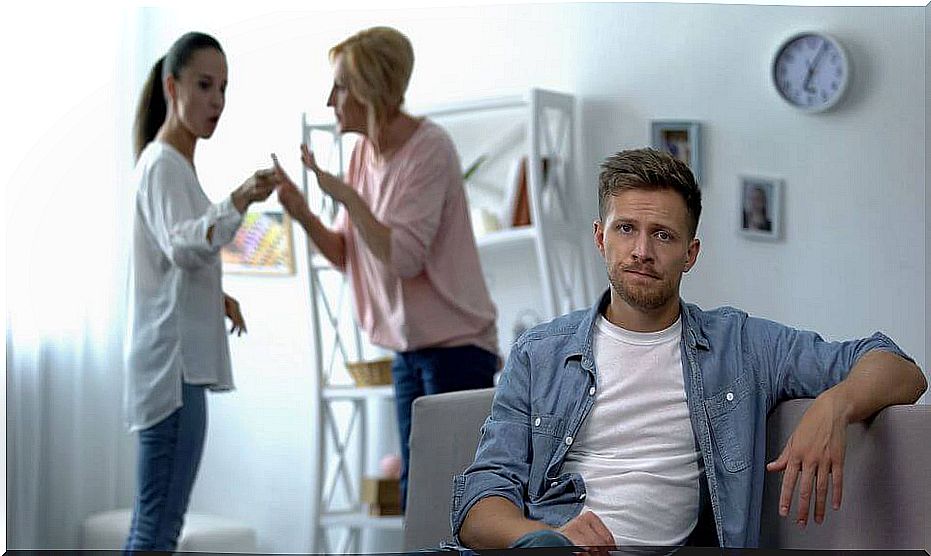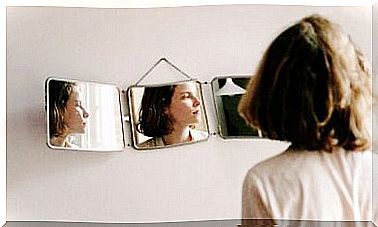My Partner’s Family Does Not Accept Me

Finding love is a great thing. However, sometimes we forget that although we can choose the person who will be part of our life, we cannot do the same with the people who accompany them. Thus, when my partner’s family does not accept me, it is common for us to go from euphoria and happiness to that unplanned restlessness, to those situations that are as uncomfortable as they are stressful.
What can we do in these cases? The first thing is to understand that each family nucleus is a world, it has its dynamics, its secrets, virtues and also its unhealthy processes. There are fathers and mothers who look down on every couple that their children bring home; without exception. Therefore, it is best in all cases not to personalize or become overly concerned by telling ourselves that “there is something wrong with us” because it is not.
In reality, these kinds of situations are as old as time itself. They have always been given and always will be. However, that does not remove the complexity itself and the challenge it poses for our relationship as a couple. Because at the end of the day, there is something obvious: we cannot separate the loved one from their family ties, nor is it advisable to ask them to choose.
Let us therefore understand what would be the most appropriate in these circumstances.

My partner’s family does not accept me, what can we do?
When we start a relationship we almost take it for granted that everything will move forward in the right way. Love always gives us that feeling of positivity that, somehow, makes us strong and inoculates us with iron optimism. However, something that one hardly ever expects is to see that my partner’s family does not accept me.
These situations not only generate disbelief and frustration in ourselves. The son or daughter of that family that puts up walls and objections to the newly chosen couple suffers immensely. In fact, it is very likely that this situation is not new to you and that you have experienced it before. That refusal and that family dislike forces him, suddenly, to place himself between two camps, on two sides that are important to him and to which he is obliged to listen.
Let us therefore see how we should act as far as possible.
There is nothing wrong with you, do not hold yourself responsible for the situation
The fact that someone does not like you does not mean that there is something negative about you. Therefore, do not place the attention on yourself, do not want to show something that you are not or become obsessed with finding a way to like or find acceptance. All this brings nothing but senseless suffering.
In reality, in most cases the real problem is simply that the son or daughter has a partner, whoever it is. There are parents who do not accept that their children grow up. Other times, there may be somewhat different factors such as wanting the children to have partners of a high socioeconomic level, who have a certain political affinity, a certain religion, that they are of the same race or culture …
All of these are elements that only build unjustifiable walls, those for which we are not responsible.
Informal meetings to be able to interact normally
To make contact with someone and improve relationships, you do not need planned and formal appointments like a dinner. Sometimes informal encounters give rise to another type of closer, more spontaneous and authentic interaction. Thus, one way of getting them to know us and change their idea of us is by favoring other types of circumstances.
Situations such as accompanying our partner to deliver something to their parents, asking them to accompany us to buy something, inviting them to an informal lunch … All of these are attempts that are worth promoting not only to break the ice and bring closer ties. With these meetings we will be able to see if there is a possibility of rapprochement or if, on the contrary, your idea about us will not change.
In the latter case, we must give way to other keys.
The most important thing: have the support of your partner and agree in each situation
If my partner’s family does not accept me, the last thing we should do is blame the loved one for the type of parents he or she has. We cannot under any circumstances criticize his family environment or threaten him with ultimatums of the type “or your parents or me.” Rather, it would be a matter of learning to accept that situation by reaching agreements between the two.
How? Counting on the constant and indisputable support of our partner. It is necessary to maintain good communication and make clear what our limits are going to be:
- We cannot allow the influence of our partner’s family to affect our relationship.
- If they get in the way in any way possible , our partner will be in charge of defending us by establishing firm limits with their parents.
- There will be things that are tolerable and that we must accept (my partner will sometimes visit his family without us). However, there will be other dimensions in which we cannot give in (blackmail, manipulation, threats). If at some point we do not feel the support of the couple, the relationship can begin to fail.

When my partner does not accept me: remember, psychological health comes first
We pointed out at the beginning that it is not advisable to propose ultimatums to our partner, forcing her to choose between us or them. Now, there are pathological situations in which children must be aware that what they are experiencing is not normal. Barbara Oudekerk, a psychologist at the University of Virginia in Charlottesville, did a very interesting study that raises something important for us.
The impact of having controlling and overprotective parents is immense. Adult children of controlling parents don’t always find happiness in their relationships. In these circumstances, it is important to make our partner see that implication. Because, indeed, there are cases in which it is advisable to put distance in order to recover health, well-being and happiness.
If our partner does not take the step, if he chooses to continue reinforcing that harmful bond that puts up walls and makes it difficult to have a healthy and mature relationship, we will be the ones who will have to choose. Our psychological and emotional balance is also important.









